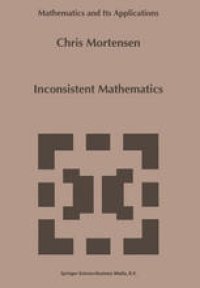
Ebook: Inconsistent Mathematics
Author: Chris Mortensen (auth.)
- Tags: Mathematical Logic and Foundations, Logic, Symbolic and Algebraic Manipulation
- Series: Mathematics and Its Applications 312
- Year: 1995
- Publisher: Springer Netherlands
- Edition: 1
- Language: English
- pdf
without a properly developed inconsistent calculus based on infinitesimals, then in consistent claims from the history of the calculus might well simply be symptoms of confusion. This is addressed in Chapter 5. It is further argued that mathematics has a certain primacy over logic, in that paraconsistent or relevant logics have to be based on inconsistent mathematics. If the latter turns out to be reasonably rich then paraconsistentism is vindicated; while if inconsistent mathematics has seri ous restriytions then the case for being interested in inconsistency-tolerant logics is weakened. (On such restrictions, see this chapter, section 3. ) It must be conceded that fault-tolerant computer programming (e. g. Chapter 8) finds a substantial and important use for paraconsistent logics, albeit with an epistemological motivation (see this chapter, section 3). But even here it should be noted that if inconsistent mathematics turned out to be functionally impoverished then so would inconsistent databases. 2. Summary In Chapter 2, Meyer's results on relevant arithmetic are set out, and his view that they have a bearing on G8del's incompleteness theorems is discussed. Model theory for nonclassical logics is also set out so as to be able to show that the inconsistency of inconsistent theories can be controlled or limited, but in this book model theory is kept in the background as much as possible. This is then used to study the functional properties of various equational number theories.
The theory of inconsistency has been growing steadily over the last two decades. One focus has been philosophical issues arising from the paradoxes of set theory and semantics. A second focus has been the study of paraconsistent or inconsistency-tolerant logics. A third focus has been the application of paraconsistent logics to problems in artificial intelligence. This book focuses on a fourth aspect: the construction of mathematical theories in which contradictions occur, and the investigation of their properties. The inconsistent approach provides a distinctive perspective on the various number systems, order differential and integral calculus, discontinuous changes, inconsistent systems of linear equations, projective geometry, topology and category theory. The final chapter outlines several known results concerning paradoxes in the foundations of set theory and semantics. The book begins with an informal chapter which summarises the main results nontechnically, and draws philosophical implications from them.
This volume will be of interest to advanced undergraduates, graduate students and professionals in the areas of logic, philosophy, mathematics and theoretical computer science.
The theory of inconsistency has been growing steadily over the last two decades. One focus has been philosophical issues arising from the paradoxes of set theory and semantics. A second focus has been the study of paraconsistent or inconsistency-tolerant logics. A third focus has been the application of paraconsistent logics to problems in artificial intelligence. This book focuses on a fourth aspect: the construction of mathematical theories in which contradictions occur, and the investigation of their properties. The inconsistent approach provides a distinctive perspective on the various number systems, order differential and integral calculus, discontinuous changes, inconsistent systems of linear equations, projective geometry, topology and category theory. The final chapter outlines several known results concerning paradoxes in the foundations of set theory and semantics. The book begins with an informal chapter which summarises the main results nontechnically, and draws philosophical implications from them.
This volume will be of interest to advanced undergraduates, graduate students and professionals in the areas of logic, philosophy, mathematics and theoretical computer science.
Content:
Front Matter....Pages i-ix
Motivations....Pages 1-14
Arithmetic....Pages 15-32
Modulo Infinity....Pages 33-38
Order....Pages 39-42
Calculus....Pages 43-58
Inconsistent Continuous Functions....Pages 59-66
The Delta Function....Pages 67-72
Inconsistent Systems of Linear Equations....Pages 73-82
Projective Spaces....Pages 83-92
Topology....Pages 93-100
Category Theory....Pages 101-114
Closed Set Sheaves and Their Categories....Pages 115-124
Duality....Pages 125-128
Foundations: Provability, Truth and Sets....Pages 129-146
Back Matter....Pages 147-158
The theory of inconsistency has been growing steadily over the last two decades. One focus has been philosophical issues arising from the paradoxes of set theory and semantics. A second focus has been the study of paraconsistent or inconsistency-tolerant logics. A third focus has been the application of paraconsistent logics to problems in artificial intelligence. This book focuses on a fourth aspect: the construction of mathematical theories in which contradictions occur, and the investigation of their properties. The inconsistent approach provides a distinctive perspective on the various number systems, order differential and integral calculus, discontinuous changes, inconsistent systems of linear equations, projective geometry, topology and category theory. The final chapter outlines several known results concerning paradoxes in the foundations of set theory and semantics. The book begins with an informal chapter which summarises the main results nontechnically, and draws philosophical implications from them.
This volume will be of interest to advanced undergraduates, graduate students and professionals in the areas of logic, philosophy, mathematics and theoretical computer science.
Content:
Front Matter....Pages i-ix
Motivations....Pages 1-14
Arithmetic....Pages 15-32
Modulo Infinity....Pages 33-38
Order....Pages 39-42
Calculus....Pages 43-58
Inconsistent Continuous Functions....Pages 59-66
The Delta Function....Pages 67-72
Inconsistent Systems of Linear Equations....Pages 73-82
Projective Spaces....Pages 83-92
Topology....Pages 93-100
Category Theory....Pages 101-114
Closed Set Sheaves and Their Categories....Pages 115-124
Duality....Pages 125-128
Foundations: Provability, Truth and Sets....Pages 129-146
Back Matter....Pages 147-158
....